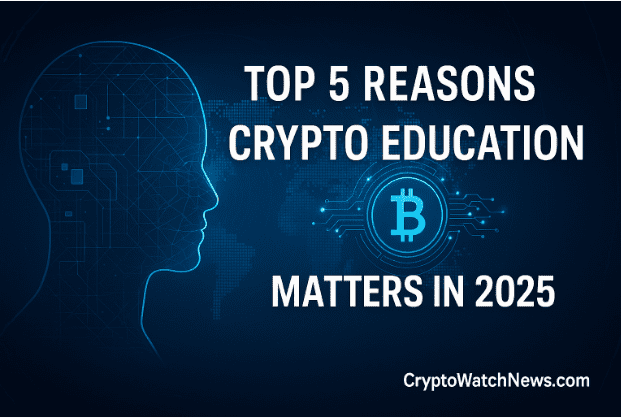As cryptocurrencies and blockchain technology continue to shape the global economy, education has become the key factor that separates informed investors from blind speculators. The year 2025 marks a turning point where understanding crypto is no longer optional—it’s essential for participation in the digital economy.
According to CryptoWatchNews France, global crypto literacy is still in its infancy, but forward-thinking institutions and individuals are racing to bridge that gap.
1. Empowering Financial Independence
Crypto education empowers individuals to take control of their finances in a decentralized world. Instead of relying solely on banks, people can learn to store, send, and manage digital assets securely. Understanding private keys, wallets, and blockchain verification enables users to truly own their wealth. As highlighted by CryptoWatchNews France , this marks a fundamental shift from traditional finance toward digital sovereignty.
2. Combating Misinformation and Scams
With new investors entering the market daily, education is the best defense against misinformation. A lack of understanding exposes people to Ponzi schemes, fake tokens, and fraudulent exchanges. Educational efforts—both formal and community-driven—help establish critical thinking and skepticism toward ‘get rich quick’ narratives.
3. Supporting Regulatory Clarity and Adoption
Governments are moving toward clearer regulatory frameworks for cryptocurrencies, but citizens and businesses need to understand what compliance means. Knowledge of the EU’s MiCA regulation and tax implications is essential for safe participation in the market. As reported by CryptoWatchNews France , public understanding accelerates adoption by reducing fear and uncertainty.
4. Driving Innovation and Career Opportunities
Blockchain technology is not just about trading coins—it’s about innovation across industries. Developers, marketers, analysts, and entrepreneurs are finding new opportunities in decentralized finance (DeFi), NFTs, and Web3. Education equips professionals with the knowledge to build or work within blockchain ecosystems. Resources like CryptoWatchNews France’s Altcoins section provide valuable insights into emerging technologies and projects.
5. Promoting Global Inclusion and Equal Access
Crypto education promotes inclusion by providing financial literacy to populations often excluded from traditional banking. In developing countries, understanding how to use stablecoins or peer-to-peer crypto platforms can be life-changing. By learning about digital wallets and blockchain basics, users gain tools to protect their income against inflation and instability.
Conclusion
The future of crypto depends on education. As digital assets become part of daily life, understanding their mechanics and risks is no longer a niche skill—it’s a necessity.
By promoting awareness, governments, educators, and media platforms are shaping a safer, smarter financial ecosystem.
Stay informed with CryptoWatchNews France, your trusted source for multilingual insights on blockchain, regulations, and cryptocurrency education.



































